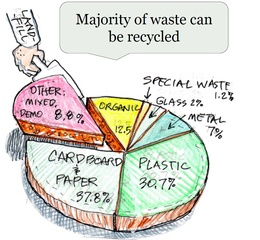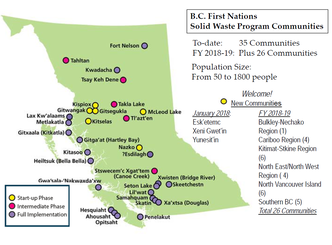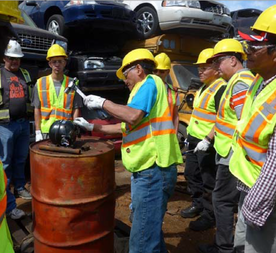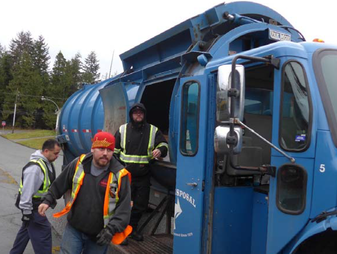BC First Nations Solid Waste Program
- Location: 61 First Nations across BC
- Project Partners: Lil’wat Nation, BC First Nations in the Solid Waste Program, Roger Vickers - Artist, Indigenous Services Canada, MOE, Regional Districts, Associations, Product Stewards, British Columbia Environmental Industry Association, training sponsors, teachers, and many more
Project Description
In 2007, the BC First Nations Solid Waste Program completed a waste audit in 16 Remote Coastal First Nations and found that the majority of waste could be recycled. It was recommended that these First Nations, and others like them, close unregulated landfills, transfer to permitted facilities, and promote the 3R's (Reduce, Reuse, Recycle). At the time, there was a mismatch between Regional District (waste shed) boundaries and coastal barge/ferry routes as well as limited & costly transport options and long waste storage times. In order to move towards zero waste, the BC First Nations Solid Waste Program built from the already ongoing local community efforts to recycle/compost, partnered with local knowledge & service providers and benefited from goodwill & cooperation from all. Local knowledge and services are critical to effective, sustainable solutions.
In 2007, the BC First Nations Solid Waste Program completed a waste audit in 16 Remote Coastal First Nations and found that the majority of waste could be recycled. It was recommended that these First Nations, and others like them, close unregulated landfills, transfer to permitted facilities, and promote the 3R's (Reduce, Reuse, Recycle). At the time, there was a mismatch between Regional District (waste shed) boundaries and coastal barge/ferry routes as well as limited & costly transport options and long waste storage times. In order to move towards zero waste, the BC First Nations Solid Waste Program built from the already ongoing local community efforts to recycle/compost, partnered with local knowledge & service providers and benefited from goodwill & cooperation from all. Local knowledge and services are critical to effective, sustainable solutions.
Project Results
The work of the BC First Nations Solid Waste Program resulted in numerous partnerships, such as:
The work of the BC First Nations Solid Waste Program resulted in numerous partnerships, such as:
- Transfer Station Collaborations (2010- 2016)
- North Arm Fuel Barge monthly backhaul to Rabanco Landfill in Washington State (4
coastal communities) - Similar collaboration with local fuel barge and disposal company on Vancouver Island west coast – 3 Nuu-chah-nulth communities
- North Arm Fuel Barge monthly backhaul to Rabanco Landfill in Washington State (4
- Regional District Mt. Waddington Board with Heiltsuk and Kitasoo (2015)
- Created a waste management agreement outside regional district boundary which enabled weekly waste transfer to 7Mile Landfill.
- Product Stewardship and MOE
- Annual Roundtables at Coast Waste Management Association Conference
- MOE supported Bella Bella's Ecodepot receiving Special Waste Product Stewardship services
- Training - Solid Waste Association of North America (SWANA)
- Transfer Station & Ecodepot Operations Level 1 Certifications for at least 100 operators in 30 First Nations since 2015
- Level 2 Organizing & Managing Transfer Stations launched in 2017
- Fox's Disposal, Port Hardy where mentoring and knowledge transfer was generously donated to Central and North Coast communities
- Freon Appliance Depollution: Practical In-Field Training at ABC Recycling, Burnaby, 2017
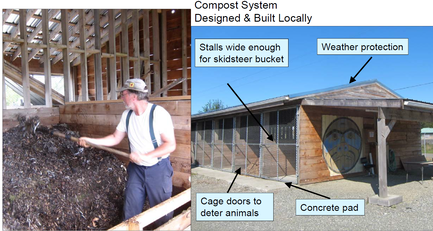
Project Outputs:
The partnerships developed, the local efforts, and the support of the BC First Nations Solid Waste Program resulted in the outputs of numerous First Nation waste programs such as:
The partnerships developed, the local efforts, and the support of the BC First Nations Solid Waste Program resulted in the outputs of numerous First Nation waste programs such as:
- Community Solid Waste Working Groups (e.g. Gitxaala and Xwisten)
- Transfer Station with solar powered electric fence at ?Esdilagh
- Recycling back hauled in an empty grocery truck 580 km from Kwadacha at Fort Ware to Prince George
- Local knowledge and innovation used in Heiltsuk (Bella Bella) to create a community compost facility that is now being replicated in other communities
- Community Education Support for teachers, health clinics and Elders
- Takla Lake Recycling Guide
- Community Education Children's Video (see video below)
- Zero Waste Education Toolkit
- Bella Bella -Heiltsuk First Nation - Moving towards Zero Waste
- Active 4Rs Program
- Community Compost diverts 100 tonnes/year
- Per capita landfill disposal at one-half BC average
- Ahousaht First Nation - Moving towards Zero Waste
- Recycling and Community Composting reduced monthly garbage from 5 bins to 2 bins (40 cu. yd. ea.)
- Gitxaala Nation - Moving towards Zero Waste
- Recycle BC (MMBC) Collector Garbage collection reduced to once/week
- Lil’wat Nation - Moving towards Zero Waste
- Transport using own truck and trailer
- Diverts 125 tonnes of steel and 33 tonnes of cardboard annually
- Depollutes fridges and freezers on site
- Lil’wat Nation - Upgrades to Meet Challenges and New Requirements
- Upgrading transfer station to sort more recyclable materials and to supervise drop-off
- Provide consolidation services to nearby communities
- Lil’wat compactors for garbage, cardboard and containers installed in 2012
|
|
